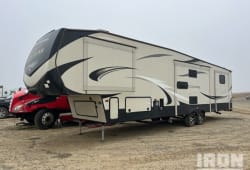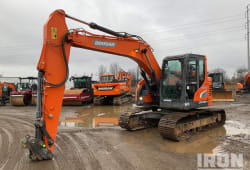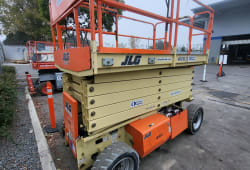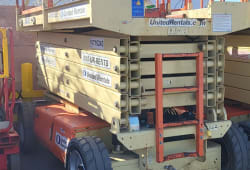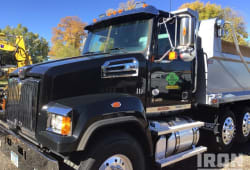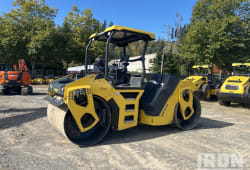Navigate The Comprehensive Guide to Earth Moving Equipment
9 Min read
)
September 12, 2023
Discover the nuts and bolts of earth-moving equipment, from their types and functionalities to the latest technological innovations and loose materials that elevate efficiency. Whether you're a seasoned professional seeking industry insights or a newcomer looking to grasp the fundamentals, our guide right equipment is your go-to resource.
Join us on this excavation journey as we unearth the power and precision of these giants and unlock the knowledge that will empower your projects. Let's dig in and unearth the hidden treasures of earth-moving equipment together!
What are The Earth Moving Equipment’s?
Earth-moving equipment refers to a wide array of heavy machinery designed to manipulate and transport earth, rocks, and other materials during construction and excavation projects. These machines include bulldozers, excavators, loaders, graders, and more. They play a pivotal role in leveling terrain, digging foundations, clearing land, and facilitating various construction tasks. Earth-moving equipment's significance extends across industries, from building infrastructure and roads to mining and agriculture.
These robust machines are engineered for power, precision, and versatility, offering solutions to complex challenges in the realm of construction on mining sites and beyond. Understanding their types and functionalities is essential for anyone involved in the world of heavy machinery and the construction of large-scale projects.
Types of Earth-Moving Equipment
Earth-moving equipment encompasses bulldozers, excavators, loaders, graders, and more. These machines excel in tasks like excavation, grading, and material transport, crucial in the construction industry, mining, and agriculture. We will discuss one by one.
Excavators:
:format(webp))
Excavators, a staple on expansive construction and industrial sites, hold a pivotal role in heavy equipment. Sporting an enclosed cab atop a wheeled or tracked undercarriage, their distinctive feature is the long, contoured arm extending from the cab, culminating in a large bucket top.
These robust machines are the go-to choice for substantial tasks like construction site demolitions and river dredging. They shine in excavating foundations, digging holes, and creating trenches. Across industries, excavators are indispensable, facilitating activities like pipe installation and heavy material handling.
Diversity abounds in the world of excavators, with options ranging from compact and utility models to those designed for reduced-tail-swing, mining, and even wheeled variants. Sizes vary widely, from compact track city-friendly "mini" excavators to behemoth hydraulic counterparts with colossal buckets.
Bulldozers:
Bulldozers, often affectionately called dozers, are robust diesel tractors sporting continuous tracks similar to tanks. They feature a substantial hydraulic blade up front, designed for heavy-duty earth-moving tasks. With its tank-like tracks, a bulldozer can navigate rugged, muddy terrains, rugged terrain typically challenging for other machinery.
While the primary role of a bulldozer is to exhibit sheer power in shifting substantial volumes of earth, it's also an incredibly useful tool. Beyond moving dirt, bulldozers can tackle rocks, brush, debris, or any material you require. Additionally, these machines are not limited to pushing; they can also flex their muscle for pulling duties and handling track loaders, trailers, tools, or hefty equipment with ease.
Backhoe loaders:
Imagine a robust machine resembling a tractor, sporting a front loader out in front (picture a giant dustpan) and a backhoe at the rear (an empty long arm, with a claw-like bucket). Backhoes, versatile workhorses, are commonly sighted on agricultural and construction sites. They handle a myriad of tasks, from digging pits and breaking asphalt to tree relocation and dirt-to-snow plowing.
Leading the pack, JCB offers a spectrum of backhoe loaders, ranging from a "compact" version with 74 hp engine power to a "super" model boasting 109 hp. While they're adaptable for various industries, JCB's 5CX Wastemaster model takes specialization up a notch, tailor-made for the waste and recycling sector.
Motor graders:
Imagine if construction machinery took on the form of an anteater; it might resemble a motor grader. Often referred to as road graders, these machines sport an elongated blade situated between the cab and front tires, expertly crafted for smoothing surfaces.
Motor graders serve a dual purpose, aiding in both road construction and the establishment of building foundations. Their initial role involves leveling the ground before paving lots or roads.
There are two primary types of motor graders to consider: the rigid frame, featuring a single axle, and the articulated frame, boasting two axles connected by a hinge, enabling nimble maneuvering within confined spaces.
Wheel Loaders:
Wheel loaders, renowned for their versatility, are heavy construction equipment icons. Their primary role is to scoop materials into their substantial wheel tractor buckets and transport them to their required destinations. You'll spot wheel loaders in diverse fields like mining, waste management, forestry, farming, landscaping, and construction sites.
What's fascinating is that due to their widespread use across industries and diverse tasks, wheel loaders come in various sizes. Hitachi offers a staggering selection of 14 distinct track loader models, spanning a weight spectrum from a mere two tons to an imposing 47 tons. These loaders adapt to the unique demands of each job site, embodying the flexibility that makes them indispensable in the world of heavy machinery.
Scrapers:
Scrapers, vital in earth-moving operations, are heavy machinery designed for bulk material handling. These versatile machines excel in tasks involving the excavation, transportation, and spreading of materials like soil, gravel, and debris. They consist of a large hopper, cutting edge, and conveyor system. As a scraper moves forward, it digs into the ground, fills its hopper, and then conveys the material to its destination, whether for a construction project, mining, or agriculture. Scrapers come in various configurations, including single-engine and twin-engine designs, offering flexibility for different projects. With their efficiency and capacity, scrapers play a pivotal role in earthworks, contributing to the success of large-scale land development and infrastructure construction projects.
Trenchers:
:format(webp))
Meet the trencher, purpose-built to do one thing exceptionally well: dig trenches. It plunges deep into the earth, effortlessly removing soil, roots, rocks, and any obstructions in its path. From homeowners needing drainage ditches to utility companies laying underground wires or pipes, trenchers serve diverse purposes.
Opt for high-performance ride-on trenchers for efficiency, or go for walk-behind models when maneuvering in tighter spaces or seeking an upper-arm workout. When it comes to trencher types, you have choices. Chain trenchers, resembling chainsaws, offer precise control, while wheel trenchers, sporting toothy metal wheels, excel at cutting through rock. Whatever your trenching needs, there's a trencher tailored to tackle the job.
Crawler tractors:
Crawler tractors, often simply called "dozers," are rugged workhorses in the construction and earth-moving industry. These heavy machines boast a continuous tracked undercarriage that provides stability on challenging terrains, making them ideal for tasks such as grading, pushing, and leveling. Equipped with a substantial blade at the front, crawler tractors excel in tasks like clearing land, building roads, and excavation. They're a common sight on construction sites, mines, and agricultural fields. With varying sizes and configurations available, crawler tractors can handle a wide range of projects, offering the power and precision needed to tackle demanding tasks in the world of heavy construction and heavy equipment itself.
Vibratory compactors:
Vibratory compactors, essential heavy machinery in construction and roadwork, excel at compacting soil, asphalt, and other materials. They employ a vibrating drum or plate to apply dynamic forces to heavy materials that reduce air gaps and increase soil or material density. These compaction machines ensure stable, durable foundations for buildings, roads, and infrastructure projects.
Vibratory compactors come in various sizes, from walk-behind models for small-scale projects to large, ride-on units for extensive operations and industrial projects. Their versatility, combined with their ability to enhance load-bearing capacity and prevent settlement, is just what makes them crucial in creating safe and long-lasting structures. These machines are synonymous with efficiency, contributing to the success of construction endeavors worldwide.
A Skid steer loader, heavy-duty dump truck, and wheel tractor scrapers are also essential pieces of equipment for large construction projects.
Where to Buy Earth Moving Equipment
When it comes to purchasing earth-moving equipment, there are several avenues to explore. First, consider authorized dealerships of renowned brands and popular manufacturers like Caterpillar, John Deere, and Komatsu. These dealers offer a range of new and used machinery with warranties and maintenance support.
Auction houses are another option, where you can bid on both new and used equipment, often at competitive prices. Online marketplaces like MachineryTrader and Equipment Trader provide extensive listings, connecting buyers with sellers worldwide.
Rental companies offer short-term solutions, allowing you to try different equipment models before committing. Lastly, don't forget to check classified ads and industry publications for local deals. Whichever route you choose, thorough research and inspections are crucial to ensure you're investing in reliable earth-moving equipment.
Conclusion
In conclusion, this comprehensive guide has unearthed the diverse world of earth-moving equipment, from excavators and bulldozers to scrapers and vibratory compactors. These heavy machines play pivotal roles across industries, shaping landscapes and driving progress. Whether you're a seasoned professional seeking insights or a newcomer looking to grasp the fundamentals, our guide empowers you with knowledge.
When it's time to acquire your equipment, numerous options await. Authorized dealerships of renowned brands provide new and used machinery with support and warranties. Auction houses offer competitive pricing, and online marketplaces connect buyers and sellers globally. Rental companies offer flexibility, and local deals can be found in classified ads and industry publications. Make an informed choice to ensure you invest in reliable earth-moving equipment that paves the way for success.

